- Home
- John Scalzi
The Last Colony Page 21
The Last Colony Read online
Page 21
Trujillo nodded. “In any event, it’s not clear they intend to remove you permanently,” he said, pointing at the PDA, which was now in Beata’s hands. “You’re being hauled up in front of an inquiry. Speaking as a former legislator, I can tell you that the point of an inquiry is usually to cover someone’s ass, not to actually inquire about something. And also speaking as a former legislator, I can tell you that the Department of Colonization has a lot of things to cover its ass about.”
“But they still wouldn’t recall you unless you did something they could point to,” Kranjic said.
“Nice, Jann,” Beata said. “We can always count on you for support.”
“I’m not saying he did anything wrong, Beata,” Kranjic snapped. Kranjic had rehired Beata as his assistant after he was made the colony’s press secretary, but it was clear their personal relationship had not vastly improved post-divorce. “I’m saying he did something that they can use as an excuse to pin something on him, to get him in front of an inquiry.”
“And you did, didn’t you?” Trujillo asked me. “When you were with General Gau, you offered him a way out. You told him not to call his fleet. You weren’t supposed to do that.”
“No, I wasn’t,” I said.
“I find it a little confusing myself,” Trujillo said.
“I needed to be able to say I made the offer,” I said. “For my own conscience.”
“The moral issues aside,” Trujillo said, “if someone wanted to get fussy about it, they could accuse you of treason. The Colonial Union’s plan required getting the Conclave fleet here. You intentionally put their strategy at risk.”
I turned to Kranjic. “You’re talking to other journalists,” I said. “Are you hearing anything about this?”
“About you being floated as a traitor? No,” Kranjic said. “There are still a lot of journalists who want to talk to either you or Jane, but it’s all about the night the Conclave fleet went down or how we’ve survived here. I’ve turned a lot of these journalists over to Manfred and the other council members. Maybe they’ve heard something along that line.”
I turned to Trujillo. “Well?” I asked.
“Nothing like that on this end, either,” Trujillo said. “But you know as well as anyone that most of what the Colonial Union is planning or thinking isn’t ever discussed outside of its own halls.”
“So they’re going to pin you as a traitor because you weren’t hopping up and down to kill a couple hundred thousand intelligent beings,” Savitri said. “I’m suddenly reminded why I loathe the Colonial Union power structure.”
“It might not just be that,” Jane said. “John may be being made a scapegoat, but if that’s true then it begs the question of what he’s being made a scapegoat for. Alternately, if his behavior with Gau is being examined, the Colonial Union is looking at how his behavior affected events.”
“You think something didn’t go according to plan,” I said to Jane.
“I think you don’t look for scapegoats when your plans go off without a hitch,” Jane said. “If the Conclave is behind tonight’s attack, it suggests that it’s gotten itself reorganized more quickly than the CU expected.”
I looked back over to Kranjic, who picked up the meaning of my glance. “There’s nothing in the media reports I’ve seen about the Conclave, positive or negative,” he said.
“That doesn’t make any sense,” I said. General Rybicki had told me that part of the plan was to introduce the Conclave to the colonies in its great moment of defeat. Now they had the moment of defeat; it should be all over the media. “There’s nothing about the Conclave at all?”
“Nothing by name,” Kranjic said. “The media reports I’ve seen mention that the Colonial Union discovered the colony had been threatened by a number of alien races, which made the CU pull its deception. They also mention the battle here. But none of it has the Conclave described as the Conclave.”
“But we know about the Conclave,” Savitri said. “Everyone here knows about the Conclave. When our people send letters or video back to family and friends, they’re going to talk about it. It’s not going to remain a secret for long. Especially after tonight.”
“There are lots of ways for the CU to spin that if they want to,” Beata said, to Savitri. “We don’t know who attacked us tonight. It could be any number of races, and there’s nothing in the attack to suggest an alliance of races. If the Colonial Union wants to minimize the idea of the Conclave, it could just tell the media it intentionally fed us bad information for our own protection. We’d be more willing to look after our own safety if we thought the entire universe was out to get us.”
Savitri pointed to me. “And his encounter with General Gau was just some sort of delusion?” she asked.
“He’s being recalled,” Beata said. “It’s entirely possible his inquiry is going to be him being told to revise his memory of the incident.”
“I didn’t realize you were this conspiracy-obsessed,” Savitri said to Beata.
“Welcome to me,” Beata said.
“It’s possible journalists and others do know about the Conclave,” Kranjic said. “It’s just not making it through the official media channels. And if the CU is actively discouraging journalists from talking about it, then they’re not likely to discuss it with us—”
“—because all our communication comes via skip drone,” Jane finished. “Which means it’s monitored by the Colonial Union.”
“Right,” Kranjic said.
I remembered Hickory’s concern about the CU listening in to its communication with other Obin. Apparently it wasn’t the only one suspicious of the CU. “Don’t you guys have code or something?” I asked Kranjic. “Some way to let other journalists know something even if you’re being monitored?”
“You want me to write ‘The hawk flies at midnight’?” Kranjic asked. “No, we don’t have a code, and even if we did, no one would risk it. You don’t think the CU looks for semantic idiosyncrasies and steganographic patterns?” He pointed to Jane. “Rumor had it she did intelligence for the CDF at one time. Ask her about it.”
“So not only do we not know what the CU knows, we can’t know what the CU knows,” Savitri said. “We might as well still be lost.”
“No,” I said. “We can know. We just can’t know from here.”
“Ah,” Trujillo said. “Your trip to Phoenix Station. You think you can find out more there.”
“Yes,” I said.
“You’ll be busy with your inquiry,” Trujillo said. “You’re not going to have a lot of time to catch up on gossip.”
“You still know people in the Colonial Union government,” I said to Trujillo.
“Unless there’s been a coup, yes,” Trujillio said. “It’s only been a year. I can get you in contact with a few people.”
“I’d rather you came with me,” I said. “As you said, I’m going to be busy with an inquiry. And your people will talk to you more candidly than they will talk to me. Especially considering what you thought of me the last time any of them talked to you.” I looked over to Kranjic. “You, too, Jann. You still know people in the media.”
Beata snorted. “He knows talking heads,” she said. “Let me come. I know the producers and the editors—the people who feed people like him their lines.”
“Both of you come,” I said, before Kranjic could get off a shot at Beata. “We need to find out as much as we can from as many different sources as we can. Manfred in the government. You two with your media contacts. Jane with Special Forces.”
“No,” Jane said. “I’m staying here.”
I stopped, more than a little surprised at this. “Special Forces carried out the attack on the Conclave Fleet,” I said. “They probably know more than anyone about what the aftereffects are. I need you to find out, Jane.”
“No,” Jane said.
“John,” Savitri said, “we’ve been attacked. Someone actually has to run the colony while you’re away. Jane needs to be here.”
There was mo
re to it than that, but Jane’s stare was flat and expressionless. Whatever it was that was going on, I wasn’t going to find out about it right then. And Savitri was right in any event. “Fine,” I said. “I still have a few people I can talk to as well. Unless they’re planning to hold me in a cell.”
“You don’t think anyone will question why the three of us will be coming along with you,” Trujillo said.
“I don’t think so,” I said. “We’ve been attacked. I’m going to be engaged in my inquiry. Manfred, you’re going to have to stand in people’s doorways and try to get the CU to increase our defenses, and fast. Beata will present herself as our cultural minister; in addition to talking to her contacts she’s going to try to get permissions for entertainment and educational programming. We have the capability for that now. And as press secretary, Jann’s going to be busy shopping around the story of Roanoke’s first year. You all have your own reasons for going. Makes sense?”
“Makes sense,” Trujillo agreed. Kranjic and Beata nodded as well.
“Good,” I said. “Our ship is due here in two days, then.” I stood up to end the meeting. I reached over to Jane to catch her before she left, but she was the first one out the door.
“Where’s Zoë?” I asked Jane, when I came back home.
“She’s over at Trujillo’s,” Jane said. She was sitting in her chair on the porch, petting Babar. “She and Gretchen and all of their friends are mourning Enzo. She’ll probably stay the night there.”
“How was she doing?” I asked.
“Someone she loved died,” Jane said. “It’s hard for anyone. She’s lost loved ones before. But this was the first time it was one of her contemporaries. One of her friends.”
“And a first love at that,” I said. “That complicates matters.”
“It does,” Jane said. “Everything’s complicated now.”
“Speaking of which, I wanted to ask you what that was about back there,” I said. “You turning down going to Phoenix Station.”
“Savitri said it,” Jane said. “It’s bad enough the colony is losing you to an inquiry, and that you’re taking Trujillo with you. Someone needs to be here.”
“But that’s not all of it,” I said. “I know you well enough to know when you’re holding something back.”
“I don’t want to be responsible for compromising the safety of the colony,” Jane said.
“How would you do that?” I said.
“For one thing, the next time I see General Szilard, I’m going to break the bastard’s neck,” Jane said. “They’re not likely to keep me on after that. Then there would be no leadership for this colony at all.”
“You were always the practical one,” I said.
“It’s who I am,” Jane agreed. “Something I got from Kathy, perhaps.”
“Perhaps,” I said. It was rare that Jane would talk directly about Kathy; it’s hard to talk to your husband about his first wife, especially when you are made from that wife’s DNA. When Jane brought up Kathy, it was an indication that other things were on her mind. I kept quiet until she was ready to tell me what was going on in her head.
“I dream about her sometimes,” Jane finally said. “About Kathy.”
“What do you dream about her?” I asked.
“That she and I talk,” Jane said. “And she tells me how you were when you were with her, and I tell her how you are with me. And we talk about our families and our lives and about each other. And when I wake up I don’t remember anything specific about what we’ve talked about. Just that we’ve talked.”
“That must be frustrating,” I said.
“It’s not,” Jane said. “Not really. I like that we just talk. I like feeling that connection with her. She’s part of who I am. Mother and sister and self. All of it. I like that she visits me. I know it’s just a dream. It’s still nice.”
“I bet it is,” I said, remembering Kathy, who Jane was so much like, even as much as she was her own person.
“I’d like to visit her one day,” Jane said.
“I’m not sure how we’d do that,” I said. “She’s been gone a long time.”
“No,” Jane said. “I mean I’d like to visit where she is now. Where she’s buried.”
“I’m not sure how we’d do that, either,” I said. “Once we leave Earth, we’re not allowed to go back.”
“I never left Earth,” Jane said, looking down at Babar, who thumped a lazy, happy beat with his tail. “Only my DNA did.”
“I don’t think the Colonial Union will make the distinction,” I said, smiling at one of Jane’s rare jokes.
“I know they won’t,” Jane said, a trace of bitterness in her voice. “Earth is too valuable as a factory to risk it being infected by the rest of the universe.” She looked over at me. “Don’t you ever want to go back? You spent most of your life there.”
“I did,” I said. “But I left because there was nothing keeping me there. My wife was dead and our kid grew up. It wasn’t too hard to say good-bye. And now what I care about is here. This is my world now.”
“Is it?” Jane said. She looked up at the stars. “I remember standing in the road back on Huckleberry, wondering if I could make another world my home. Make this world my home.”
“Can you?” I asked.
“Not yet,” Jane said. “Everything about this world shifts. Every reason we’ve thought we had for being here has turned out to be a half-truth. I care about Roanoke. I care about the people here. I will fight for them and I’ll defend Roanoke the best that I can, when it comes to that. But this isn’t my world. I don’t trust it. Do you?”
“I don’t know,” I said. “I know that I’m worried this inquiry will take it away from me, though.”
“Do you think anyone here cares anymore about who the Colonial Union thinks should run this colony?” Jane asked.
“Possibly not,” I said. “But it would still hurt.”
“Hmmm,” Jane said, and thought about that for a while. “I still want to see Kathy one day,” she eventually said.
“I’ll see what I can do,” I said.
“Don’t say that unless you mean it,” Jane said.
“I mean it,” I said, and was somewhat surprised that, in fact, I did. “I would like you to meet her. I wish you could have met her before.”
“So do I,” Jane said.
“It’s settled, then,” I said. “Now all we have to do is find a way to get back to Earth without getting our ship shot out from under us by the CU. I’ll have to work on that.”
“Do that,” Jane said. “But later.” She stood and held out her hand to me. I took it. We went inside.
TWELVE
“Our apologies, Administrator Perrry, for the late start,” said Justine Butcher, Assistant Deputy Secretary for Colonial Jurisprudence for the Department of Colonization. “As you may be aware, things have been quite hectic around here recently.”
I was aware. When Trujillo, Kranjic, Beata and I disembarked the shuttle from our transport ship to Phoenix Station, the general station buzz appeared to have trebled; none of us had ever recalled seeing the station as jam-packed with CDF soldiers and CU functionaries as it appeared to be now. Whatever was going on, it was big. All of us glanced at each other significantly, because whatever it was, it almost certainly involved us and Roanoke in some way. We fanned out from each other wordlessly, off to our own individual tasks.
“Of course,” I said. “Anything in particular causing the rush?”
“It’s a number of things, happening at once,” Butcher said. “None of which you need to concern yourself with at the moment.”
“I see,” I said. “Very well.”
Butcher nodded, and signified the two other people seated at the table, before which I stood. “This inquiry has been impaneled in order to question you about your conversation with General Tarsem Gau of the Conclave,” Butcher said. “This is a formal inquiry, which means that you are required to answer any and all questions truthfully, directly
and completely as possible. However, this is not a trial. You have not been charged with any crime. If at a future point you are charged with a crime, you will be tried through the Department of Colonization’s Court of Colonial Affairs. Do you understand?”
“I do,” I said. The DoC’s Colonial Affairs Courts were judge-only affairs, designed to let colony heads and their appointed judges make quick decisions so the colonists could get on with colonizing. A CA Court ruling had the force of law, although limited to that specific case only. A CA Court judge or colony head acting as judge could not circumvent Department of Colonization regulations and bylaws, but as the DoC recognized the wide range of colonial situations were not uniform in their regulatory needs, those regulations and bylaws were surprisingly few. Colonial Affairs Courts were also organizationally flat; there was no appealing a Colonial Affairs Court ruling. Essentially a CA Court judge could do whatever he or she wanted. It was not an optimal legal situation for a defendant.
“Fine,” Butcher said, and looked at her PDA. “Then let’s begin. When you were conversing with General Gau, you offered first to take his surrender, and then offered to allow him to leave Roanoke space without injury to himself or to his fleet.” She looked up at me over the PDA. “This is correct, Administrator?”
“That’s right,” I said.
“General Rybicki, whom we have already called”—this was news to me, and I was suddenly sure that Rybicki was now less than entirely pleased he ever suggested me for the colonial administrator position—“testified to us that your orders were to engage Gau in nonessential discussions only, until the fleet was destroyed, at which point you were to inform him that only his ship had survived the attack.”
“Yes,” I said.
“Very well,” Butcher said. “Then you may begin by explaining what you were thinking when you offered to accept Gau’s surrender, and then offered to let his fleet go unharmed.”
“I suppose I was hoping to avoid bloodshed,” I said.
“It’s not your place to make that call,” said Colonel Bryan Berkeley, who represented the Colonial Defense Forces at the inquiry.

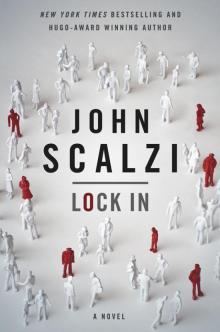 Lock In
Lock In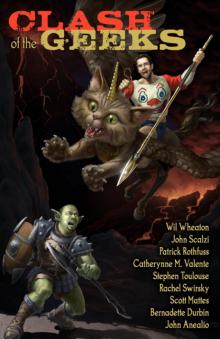 Clash of the Geeks
Clash of the Geeks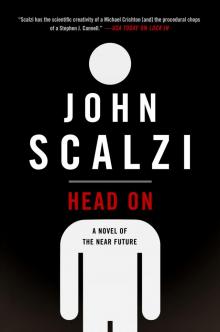 Head On
Head On The Dog King
The Dog King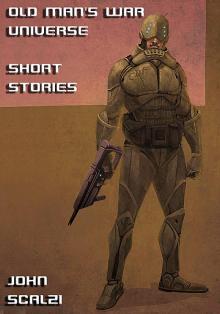 Old Man's War Universe: Short Stories
Old Man's War Universe: Short Stories The End of All Things
The End of All Things Tales From the Clarke
Tales From the Clarke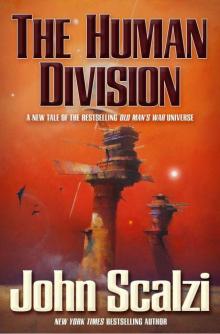 The Human Division
The Human Division The Android's Dream
The Android's Dream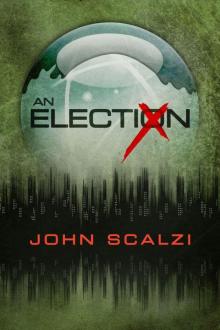 An Election
An Election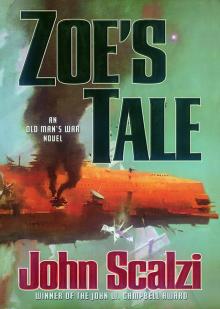 Zoe's Tale
Zoe's Tale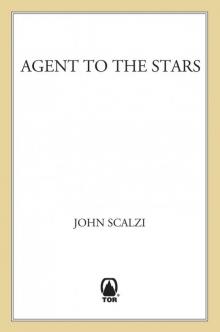 Agent to the Stars
Agent to the Stars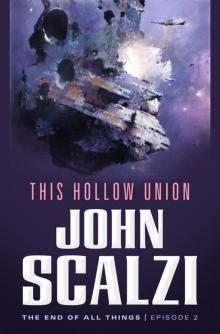 This Hollow Union
This Hollow Union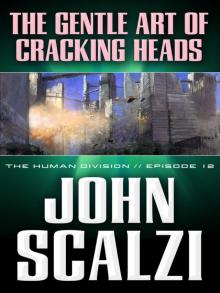 The Gentle Art of Cracking Heads
The Gentle Art of Cracking Heads Old Man's War
Old Man's War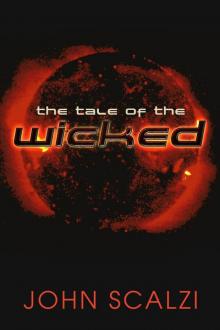 The Tale of the Wicked
The Tale of the Wicked Your Hate Mail Will Be Graded: A Decade of Whatever, 1998-2008
Your Hate Mail Will Be Graded: A Decade of Whatever, 1998-2008 Judge Sn Goes Golfing
Judge Sn Goes Golfing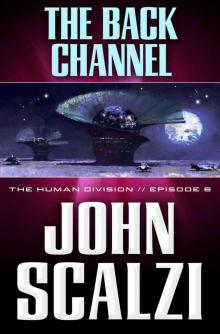 The Back Channel
The Back Channel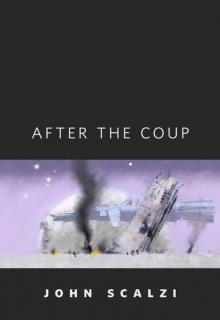 The Human Division 0.5 - After the Coup
The Human Division 0.5 - After the Coup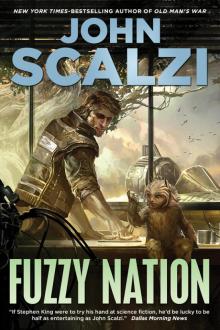 Fuzzy Nation
Fuzzy Nation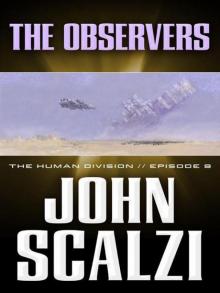 The Observers
The Observers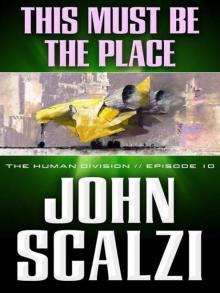 This Must Be the Place
This Must Be the Place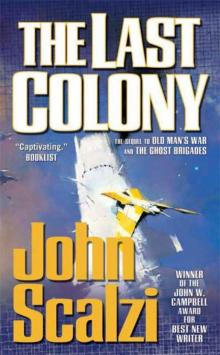 The Last Colony
The Last Colony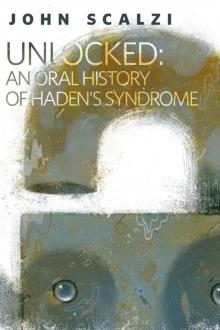 Unlocked: An Oral History of Haden's Syndrome
Unlocked: An Oral History of Haden's Syndrome A Voice in the Wilderness
A Voice in the Wilderness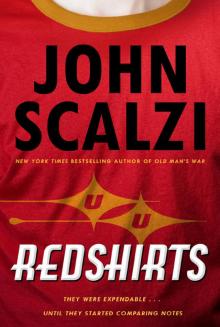 Redshirts
Redshirts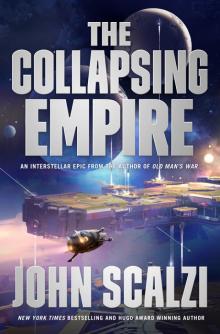 The Collapsing Empire
The Collapsing Empire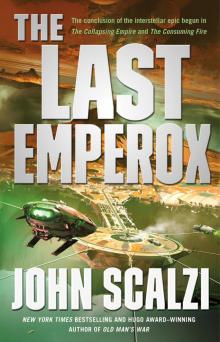 The Last Emperox
The Last Emperox The God Engines
The God Engines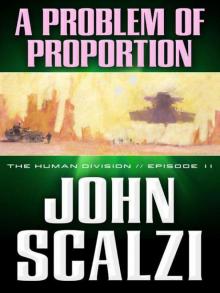 A Problem of Proportion
A Problem of Proportion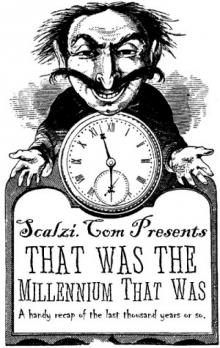 THAT WAS THE MILLENIUM THAT WAS
THAT WAS THE MILLENIUM THAT WAS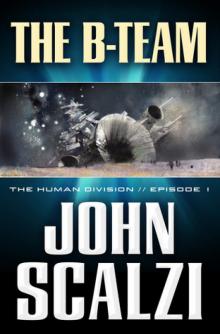 The B-Team
The B-Team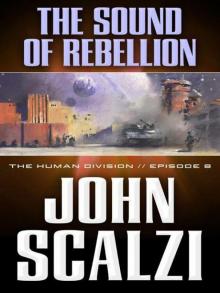 The Sound of Rebellion
The Sound of Rebellion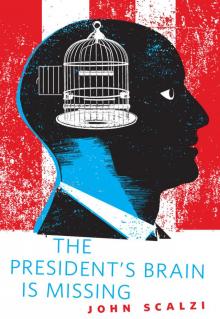 The President's Brain Is Missing
The President's Brain Is Missing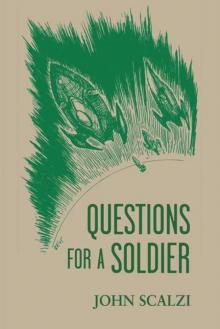 Questions for a Soldier
Questions for a Soldier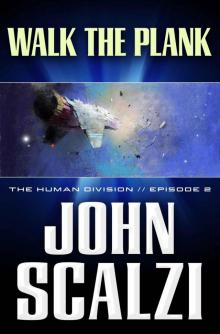 Walk the Plank
Walk the Plank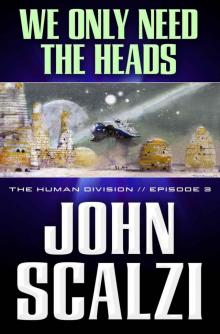 We Only Need the Heads
We Only Need the Heads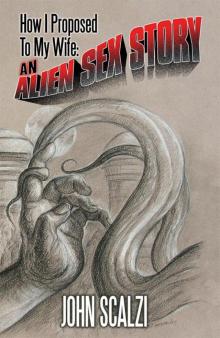 How I Proposed to My Wife: An Alien Sex Story
How I Proposed to My Wife: An Alien Sex Story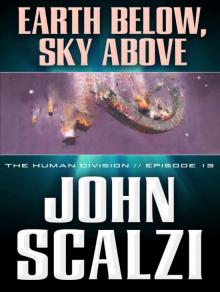 Earth Below, Sky Above
Earth Below, Sky Above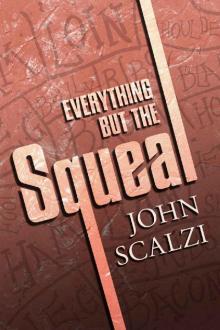 Everything but the Squeal
Everything but the Squeal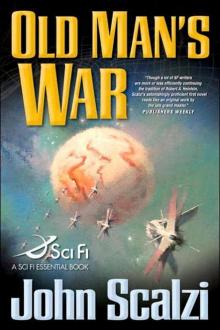 Old Man’s War
Old Man’s War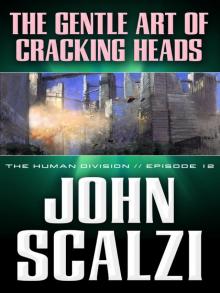 The Human Division #12: The Gentle Art of Cracking Heads
The Human Division #12: The Gentle Art of Cracking Heads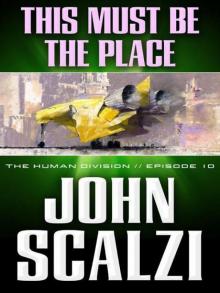 This Must Be the Place thd-10
This Must Be the Place thd-10 A Voice in the Wilderness thd-4
A Voice in the Wilderness thd-4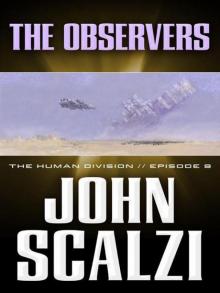 The Observers thd-9
The Observers thd-9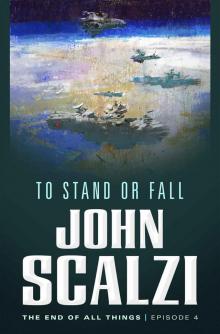 The End of All Things: The Fourth Instalment
The End of All Things: The Fourth Instalment Earth Below, Sky Above thd-13
Earth Below, Sky Above thd-13 Zoe`s Tale вбиос-4
Zoe`s Tale вбиос-4 After the Coup
After the Coup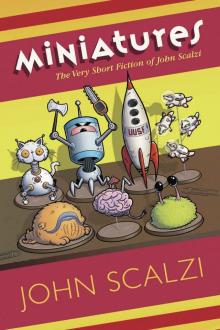 Miniatures: The Very Short Fiction of John Scalzi
Miniatures: The Very Short Fiction of John Scalzi The Last Colony вбиос-3
The Last Colony вбиос-3 Tales From the Clarke thd-5
Tales From the Clarke thd-5 Old Man's War omw-1
Old Man's War omw-1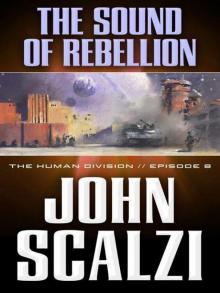 The Human Division #8: The Sound of Rebellion
The Human Division #8: The Sound of Rebellion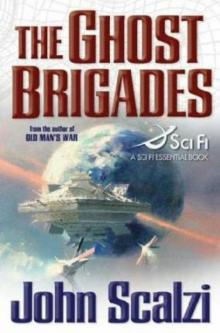 The Ghost Brigades omw-2
The Ghost Brigades omw-2 The Sagan Diary (old man's war)
The Sagan Diary (old man's war)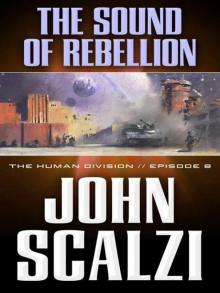 The Sound of Rebellion thd-8
The Sound of Rebellion thd-8 The Human Division 13 - Earth Below, Sky Above
The Human Division 13 - Earth Below, Sky Above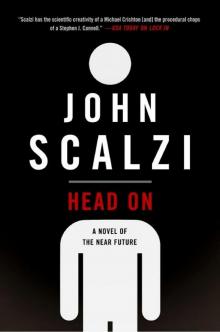 Head On_A Novel of the Near Future
Head On_A Novel of the Near Future The End of All Things: The First Instalment
The End of All Things: The First Instalment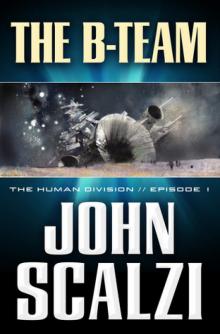 The B-Team thd-1
The B-Team thd-1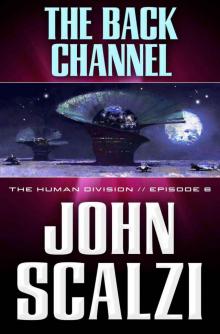 The Back Channel thd-6
The Back Channel thd-6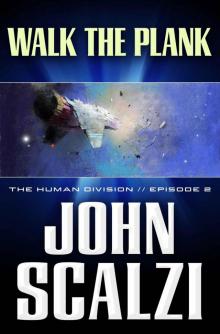 Walk the Plank thd-2
Walk the Plank thd-2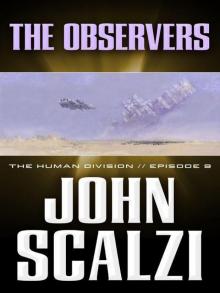 The Human Division #9: The Observers
The Human Division #9: The Observers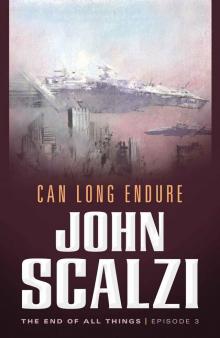 The End of All Things: The Third Instalment
The End of All Things: The Third Instalment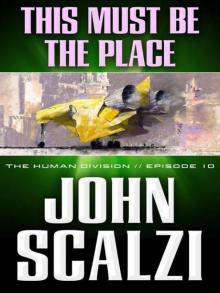 The Human Division #10: This Must Be the Place
The Human Division #10: This Must Be the Place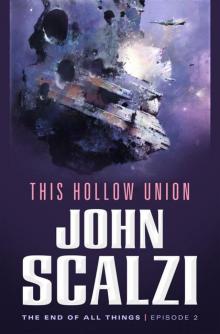 The End of All Things #2: This Hollow Union
The End of All Things #2: This Hollow Union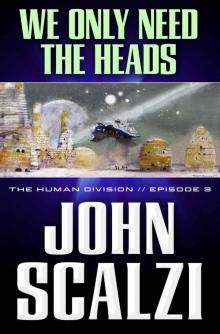 We Only Need the Heads thd-3
We Only Need the Heads thd-3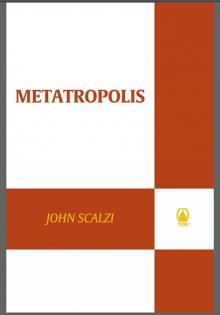 Metatropolis
Metatropolis The Dog King thd-7
The Dog King thd-7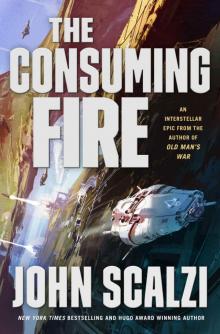 The Consuming Fire (The Interdependency)
The Consuming Fire (The Interdependency)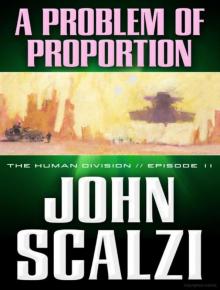 The Human Division #11: A Problem of Proportion
The Human Division #11: A Problem of Proportion